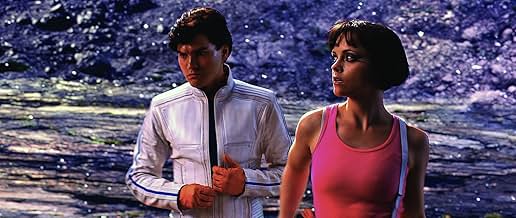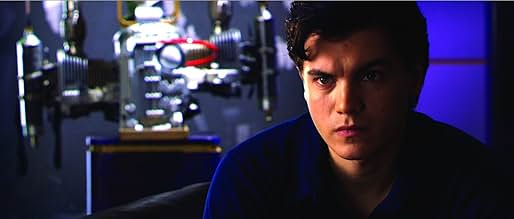Um jovem piloto, Speed Racer, aspira a ser campeão mundial de corridas com a ajuda de sua família e seu carro Mach 5 de alta tecnologia.Um jovem piloto, Speed Racer, aspira a ser campeão mundial de corridas com a ajuda de sua família e seu carro Mach 5 de alta tecnologia.Um jovem piloto, Speed Racer, aspira a ser campeão mundial de corridas com a ajuda de sua família e seu carro Mach 5 de alta tecnologia.
- Prêmios
- 1 vitória e 12 indicações no total
Giancarlo Ganziano
- Everyman Announcer
- (as Gian Ganziano)
- Direção
- Roteiristas
- Elenco e equipe completos
- Produção, bilheteria e muito mais no IMDbPro
Enredo
Você sabia?
- CuriosidadesPeter Fernandez and Corinne Orr, the original English voices of Speed Racer/Racer X and Trixie/Spritle in Speed Racer (1967), voice race announcers in the film.
- Erros de gravaçãoDuring the first race, Speed is driving the Mach 6. Although many believe this car wasn't built until just before the final WRL Grand Prix at the end of the movie, the Mach 6 was Speed's main car until it was destroyed at Fuji. The Mach 6 was rebuilt for the Grand Prix since the Mach 5 still had the defensive features from Casa Cristo which weren't allowed.
- Cenas durante ou pós-créditosThe directors' credits spin out of a wheel, similar to how the title of Speed Racer (1967) appears.
- Trilhas sonorasGo Speed Racer Go
Written by Nobuyoshi Koshibe and Yoshida Yoshiyuki
Avaliação em destaque
I saw this the same night as the latest film by my favorite filmmaker and I must admit that this held its own.
Sure, the story is silly and there are the requisite two lessons for children. All the shots with the parents could have been replaced with a dialog card so far as I care. But this is highly cinematic in a fine-grained sense.
Coursegrained long form would be the cinematic values of that Peter Greenaway film, where the narrative has substance and is cast cinematically. The contrast is shocking, with this Wachowski business seeming to be mere busy style.
But look again. There's real value in how the story is told even though the story is as close to vacuous white noise as possible. In fact, there's a statement there that matters. This movie is about movie-making. The watchers of the "race" are watchers of the movie. Its a simple fold.
I consider this the best of the brothers' films because their sometimes intriguing plots distract from their deeper intent. That intent is to visually explore what it means to watch. Sure, those plots are about watching as well. But people watch "The Matrix" and build religions around the story mechanics as if they matter. Previously, "Bound" was my favorite Wachowski film because it suppressed the noise of the story so as to equal the expression of that story in terms of the eye, the desire of eye.
These folks are to Welles as Coltrane is to Getz. They run riffs whose patterns are derived from the languid, meaningfilled studies of what went before, but which are presented so quickly you cannot possibly comprehend the fullness with which they were originally loaded.
That overloading of serious visual grammar has an immediate effect: that we are really there instead of digesting something filtered to be simple enough for us to understand. But there's a deeper effect: there is so much motion here, so many paths we can choose from to decide what we see, that there's a sort of tease between the film and our mind about what options they will present and what tricks they will use to suggest paths to comprehension. And on our part to discard, to race ahead of the track suggested, to speed ahead and get to the end before even the movie.
I consider this serious work, and an advance in film grammar that possibly will be profound.
Ted's Evaluation -- 3 of 3: Worth watching.
Sure, the story is silly and there are the requisite two lessons for children. All the shots with the parents could have been replaced with a dialog card so far as I care. But this is highly cinematic in a fine-grained sense.
Coursegrained long form would be the cinematic values of that Peter Greenaway film, where the narrative has substance and is cast cinematically. The contrast is shocking, with this Wachowski business seeming to be mere busy style.
But look again. There's real value in how the story is told even though the story is as close to vacuous white noise as possible. In fact, there's a statement there that matters. This movie is about movie-making. The watchers of the "race" are watchers of the movie. Its a simple fold.
I consider this the best of the brothers' films because their sometimes intriguing plots distract from their deeper intent. That intent is to visually explore what it means to watch. Sure, those plots are about watching as well. But people watch "The Matrix" and build religions around the story mechanics as if they matter. Previously, "Bound" was my favorite Wachowski film because it suppressed the noise of the story so as to equal the expression of that story in terms of the eye, the desire of eye.
These folks are to Welles as Coltrane is to Getz. They run riffs whose patterns are derived from the languid, meaningfilled studies of what went before, but which are presented so quickly you cannot possibly comprehend the fullness with which they were originally loaded.
That overloading of serious visual grammar has an immediate effect: that we are really there instead of digesting something filtered to be simple enough for us to understand. But there's a deeper effect: there is so much motion here, so many paths we can choose from to decide what we see, that there's a sort of tease between the film and our mind about what options they will present and what tricks they will use to suggest paths to comprehension. And on our part to discard, to race ahead of the track suggested, to speed ahead and get to the end before even the movie.
I consider this serious work, and an advance in film grammar that possibly will be profound.
Ted's Evaluation -- 3 of 3: Worth watching.
- tedg
- 9 de mai. de 2008
- Link permanente
Principais escolhas
Faça login para avaliar e ver a lista de recomendações personalizadas
Detalhes
- Data de lançamento
- Países de origem
- Central de atendimento oficial
- Idioma
- Também conhecido como
- Meteoro, la película
- Locações de filme
- Empresas de produção
- Consulte mais créditos da empresa na IMDbPro
Bilheteria
- Orçamento
- US$ 120.000.000 (estimativa)
- Faturamento bruto nos EUA e Canadá
- US$ 43.945.766
- Fim de semana de estreia nos EUA e Canadá
- US$ 18.561.337
- 11 de mai. de 2008
- Faturamento bruto mundial
- US$ 93.945.766
- Tempo de duração2 horas 15 minutos
- Cor
- Mixagem de som
- Proporção
- 2.35 : 1
- 2.39 : 1
Contribua para esta página
Sugerir uma alteração ou adicionar conteúdo ausente





































